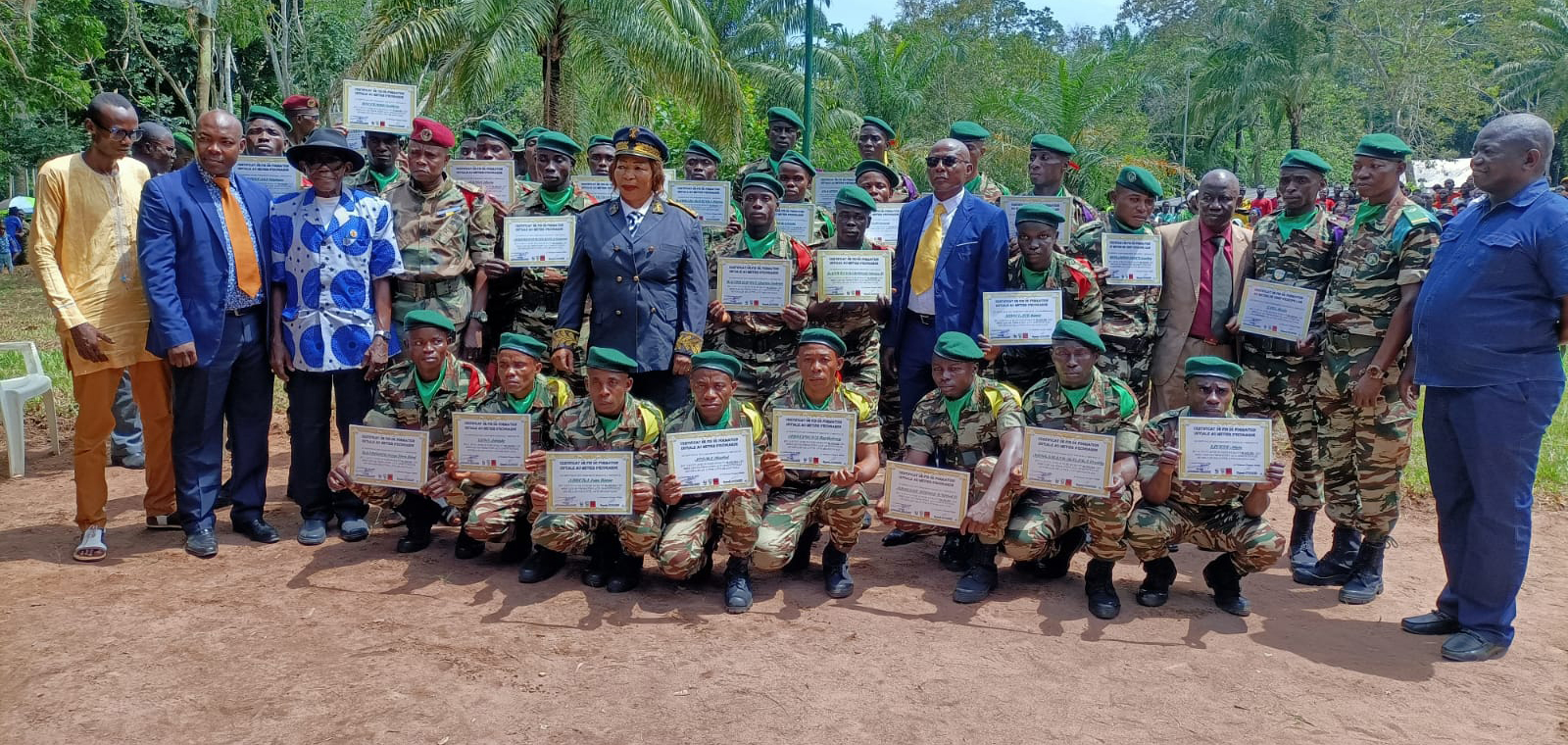The Class of 2022 Ranger Graduates pose with their certificates
Across all Chengeta’s projects, being a ranger is a proud role undertaken to not only protect the wildlife in the national parks but it’s a hardworking and respected job that allows rangers to provide for their families and local communities.
After months of hard work learning on-the-job forest patrol and survival skills, wildlife tracking and community engagement the rangers, pictured above with their graduation certificates, are now fully qualified rangers, trained by Chengeta, ready to take on their official role as Park eco-guards in the Dzanga Sangha Protected Areas (DSPA) in the Central African Republic. Watch their euphoric celebrations as they graduate in the video below.
For World Ranger Day 2022, we celebrate the rangers, acknowledging the important job they do, sharing what it truly means to be a ranger and meeting some of the rangers Chengeta has trained in the Central African Republic this year.
Chengeta trains passionate and determined rangers who work hard on their training programmes. The rangers come from different walks of life and each has a personal reason for wanting to become a ranger.
Meet four rangers from our Central African Republic project and find out what motivates them to be a ranger:
Why did you want to be a ranger?
Leon is from a village further north of the Dzanga Sangha Protected Areas Complex where the BaAka community are hunting in a mostly depleted forest and when he had the chance to come visit his family in Yandoumbé he saw that wildlife was still living in the area. Leon thought it was important to project the animals and the forest. This is why he was looking to have the job of a ranger, because he believes that future generations need to see wildlife.
What were your impressions during the training?
“I gave my best efforts during the trainings and had to show a lot of bravery to get through all of the steps and a lot of determination,” says Leon. During the process Leon said he never felt any fear or doubt because he was sure of his choice. The only time he felt any stress was during the ceremony!
What makes a “good ranger”?
Leon believes that “a good ranger has to have respect for themselves, their comrades, their commanders, the work and the community.”
Leon
Why did you want to be a ranger?
When Alain decided that he wanted to become a ranger Bayanga was a smaller village, but he recalls that at this time illegal poaching activities, especially for elephants, were more common. The high amount of elephant poaching at this time made him decide that he wanted to become a ranger for Dzanga Sangha.
What did you do during the recent recruitment of rangers?
During the recent recruitment and training of the new class of rangers, Alain had the chance to take on a new role, Aid Monitor. The was a proud moment for Alain. In this role Alain provided support to the Lead and Assistant Chengeta Wildlife trainers and learned new skills that will help him as a leader in the future. “I was proud to be able to pass my knowledge to the next group of young rangers,” Alain says.
What makes a “good ranger”?
Alain believes that “being a good ranger means being professional, remarkable, working with respect and with a focus on human rights, and also following the professional ethics of working for Les Aires Protégées de Dzanga-Sangha (APDS).”
Janita’s Personal Story
Janita was orphaned when she was very young. Because of this, she had no support or opportunity to go very far with her formal education or to learn a trade skill. During her youth, she was inspired by the few female rangers that she saw in Bayanga because it seemed they had been able to take their lives into their own hands and they were so independent. For Janita, this is why she wanted to become a ranger.
What were your impressions during the training?
Janita said that the training was physically hard but her spirit was stronger. For her, there were not any negative aspects of the training as she was learning to become stronger and she was aware that she was had access to an amazing opportunity. She never felt any doubts. She gradually found that she was becoming part of a big family. For Janita, the ceremony was a wonderful moment.
What makes a “good ranger”?
Janita is proud of her work. She believes “a good ranger should be rigorous in their work ethic and always be ready to put the job first”.
Janita
Bernadette became a ranger because of her love of nature and her understanding that nature must be protected from some human threats.
Why is female ranger recruitment so important?
Bernadette is proud of the latest ranger recruitment and is happy to see that female rangers have been integrated into the unit as she believes that women have much to offer when it comes to the protection of the environment. But Bernadette does not want to stop there, she wants to encourage local women to engage even further because “there are not enough women in conservation.” For the new female rangers, she says their place is well earned as they are “very strong in their work.”
What makes a “good ranger”?
Bernadette believes that “a good ranger should show dedication, loyalty, and bravery.”
Bernadette has loved her job as a ranger. She feels this job has not only allowed her to contribute to conservation but helped her to raise her family and educate her six children.
In this euphoric video, watch as Dzanga Sangha’s latest training recruits graduate to become wildlife rangers in the Central African Republic.
They will be actively on patrol protecting such endangered species as forest elephants, pangolins and western lowland gorillas.
We are SO proud of them! Enjoy the commemorative video below marking their graduation ceremony. See how much this means to not only the rangers and their families but also to the entire community as villages from across the area come out to celebrate their fantastic achievements.
Bravo à tous les rangers!

